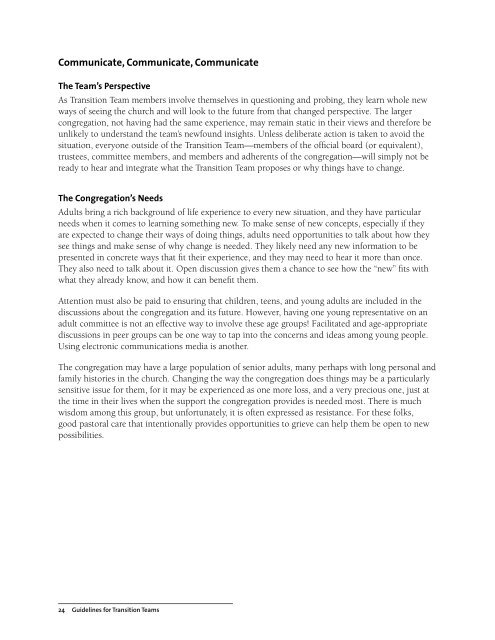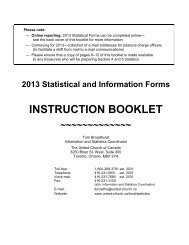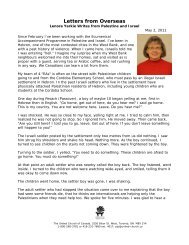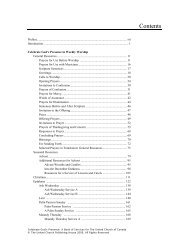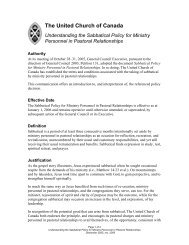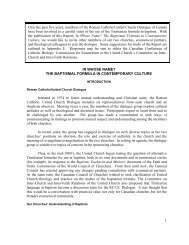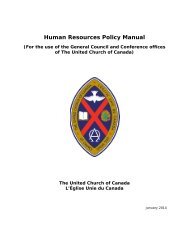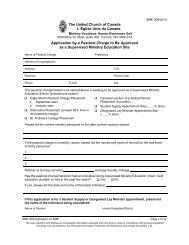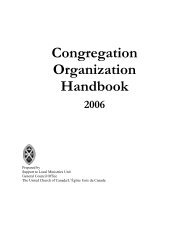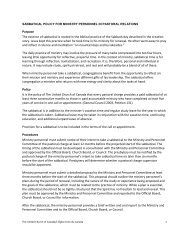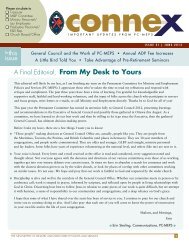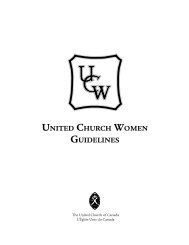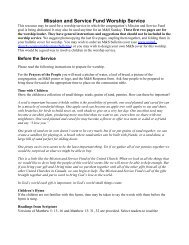Guidelines for Transition Teams - The United Church of Canada
Guidelines for Transition Teams - The United Church of Canada
Guidelines for Transition Teams - The United Church of Canada
You also want an ePaper? Increase the reach of your titles
YUMPU automatically turns print PDFs into web optimized ePapers that Google loves.
Communicate, Communicate, Communicate<br />
<strong>The</strong> Team’s Perspective<br />
As <strong>Transition</strong> Team members involve themselves in questioning and probing, they learn whole new<br />
ways <strong>of</strong> seeing the church and will look to the future from that changed perspective. <strong>The</strong> larger<br />
congregation, not having had the same experience, may remain static in their views and there<strong>for</strong>e be<br />
unlikely to understand the team’s newfound insights. Unless deliberate action is taken to avoid the<br />
situation, everyone outside <strong>of</strong> the <strong>Transition</strong> Team—members <strong>of</strong> the <strong>of</strong>ficial board (or equivalent),<br />
trustees, committee members, and members and adherents <strong>of</strong> the congregation—will simply not be<br />
ready to hear and integrate what the <strong>Transition</strong> Team proposes or why things have to change.<br />
<strong>The</strong> Congregation’s Needs<br />
Adults bring a rich background <strong>of</strong> life experience to every new situation, and they have particular<br />
needs when it comes to learning something new. To make sense <strong>of</strong> new concepts, especially if they<br />
are expected to change their ways <strong>of</strong> doing things, adults need opportunities to talk about how they<br />
see things and make sense <strong>of</strong> why change is needed. <strong>The</strong>y likely need any new in<strong>for</strong>mation to be<br />
presented in concrete ways that fit their experience, and they may need to hear it more than once.<br />
<strong>The</strong>y also need to talk about it. Open discussion gives them a chance to see how the “new” fits with<br />
what they already know, and how it can benefit them.<br />
Attention must also be paid to ensuring that children, teens, and young adults are included in the<br />
discussions about the congregation and its future. However, having one young representative on an<br />
adult committee is not an effective way to involve these age groups! Facilitated and age-appropriate<br />
discussions in peer groups can be one way to tap into the concerns and ideas among young people.<br />
Using electronic communications media is another.<br />
<strong>The</strong> congregation may have a large population <strong>of</strong> senior adults, many perhaps with long personal and<br />
family histories in the church. Changing the way the congregation does things may be a particularly<br />
sensitive issue <strong>for</strong> them, <strong>for</strong> it may be experienced as one more loss, and a very precious one, just at<br />
the time in their lives when the support the congregation provides is needed most. <strong>The</strong>re is much<br />
wisdom among this group, but un<strong>for</strong>tunately, it is <strong>of</strong>ten expressed as resistance. For these folks,<br />
good pastoral care that intentionally provides opportunities to grieve can help them be open to new<br />
possibilities.<br />
24 <strong>Guidelines</strong> <strong>for</strong> <strong>Transition</strong> <strong>Teams</strong>


